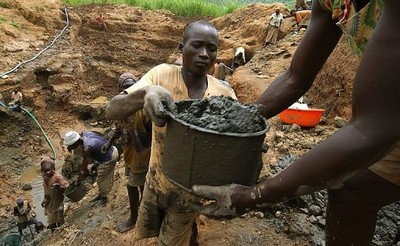
Mineral extraction is a lucrative business in the Democratic Republic of Congo. Western multi-national firms are dependent upon these resources in order to make profit within the world capitalist market. The country marked its 50th anniversary June 30., a photo by Pan-African News Wire File Photos on Flickr.
Congo peace deal delayed at African Union summit
Tue Jan 29, 2013 3:39AM GMT
presstv.ir
The leaders of countries in the Great Lakes region of Africa have not signed a UN-mediated peace deal aimed at ending the interminable cycles of violence in the eastern Democratic Republic of Congo because UN Secretary General Ban Ki-moon delayed the signing.
Leaders from the International Conference on the Great Lakes Region (ICGLR) had originally been expected to sign the deal on Monday on the sidelines of the African Union summit in the Ethiopian capital Addis Ababa. But the deal was delayed over what the United Nations chief called "procedural issues."
Seraphin Ngwej, a senior diplomatic adviser to Congolese President Joseph Kabila, said regional leaders had raised concerns over who would control and command an international military force, which would come from the Southern Africa Development Community (SADC).
In July 2012, Kabila and Rwandan President Paul Kagame, along with other leaders from the Great Lakes region, signed an accord that foresees the creation of a neutral international military force to combat rebels in the provinces of North Kivu and South Kivu in the eastern Congo.
The agreement calls for the Great Lakes leaders to work with the African Union and the United Nations "for an immediate establishment of a neutral international force to eradicate M23, FDLR (Democratic Forces for the Liberation of Rwanda) and all other negative forces in eastern DRC, and patrol and secure the border zones."
"(SADC) wants assurances the brigade can do what they want it to do," a diplomatic source, who spoke on condition of anonymity, said on Monday in Addis Ababa.
Ban said he had postponed the signing because of "procedural differences" and stressed there were no fundamental differences holding back the agreement.
"This is a broader political and security framework whereby the country, particularly (Congo), will be committed to certain policies regarding the situation," Ban said.
"To cope with the threat posed by armed groups in the eastern part of the country, we plan to create a peace enforcement force in the mission," the UN secretary general stated.
The March 23 movement (M23) rebels defected from the Congolese army in April 2012 in protest over alleged mistreatment in the Armed Forces of the Democratic Republic of Congo (FARDC). They had previously been integrated into the Congolese army under a peace deal signed in 2009.
Since early May 2012, nearly 3 million people have fled their homes in the eastern Congo. Most of them (about 2.5 million) have resettled in Congo, but more than 460,000 have crossed into neighboring Rwanda and Uganda.
Congo has faced numerous problems over the past few decades, such as grinding poverty, crumbling infrastructure, and a war in the east of the country that has dragged on since 1998 and left over 5.5 million people dead.
No comments:
Post a Comment